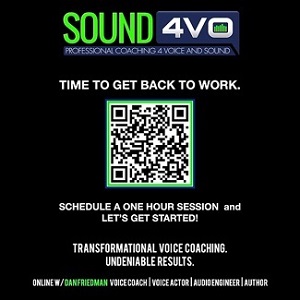|
CAREER Your Guide To Today's Voice-Over Genres For Art, Fame And Money August 21, 2018  By J. Michael Collins By J. Michael CollinsVoice Actor, Coach, Producer Voice-over talent and those aspiring to join their ranks are motivated
by many different drivers. Ultimately, though, most talent can define
their motivation down to one (or a combination) of three different
things:
Where
you find your motivation is directly relevant to the kind of work you
will want to do, and I often find today's talent unsure of the best
direction for their careers based on their motivation. So, let's have a
look at which of the different voice-over genres fit into each motivation
category. COMMERCIALS For Art, Fame and Money ART:
Commercials in the modern VO world require proper acting chops, and
what's hot is constantly shifting with consumer tastes. This gives
talent the opportunity to constantly hone their craft and learn new
techniques, and commercial VO lets the voice actor play, with ad-libbing
and getting playfully lost in the copy encouraged. FAME: While
most commercial VO actors don't become famous for their work,
opportunities do come along to voice an iconic campaign or character,
and the actors who book those roles do often achieve some level of name
recognition within the industry, and sometimes even in pop culture. MONEY:
Outside of celebrity-level animation, high end commercial work still
offers the biggest paydays, especially at the union level. While
commercial rates are under more pressure today than ever before, a major
national campaign can still pay for a nice car, if not a house.
Moreover, local and regional work (though less lucrative on a job per
job basis) is abundant, and compensation for lower-level and non-union
work is stable if not amazing. ANIMATION For Art, Fame and Money ART:
Animation VO is as close as most voice talent will ever come to being
an on-camera actor. Bringing a character to life on TV or in a movie
requires pure acting chops and a gleeful attitude towards the work. It's
no surprise that most animation actors find other genres of voice-over
comparatively easy, as they have mastered the most challenging skills
already. FAME: Today's most recognized voice actors (with a few
exceptions) are animation actors. These roles are prized for their
visibility and career-defining nature, and are sought after by most VOs
who are in it for the recognition. MONEY: At the high end, no one
earns more than top animation VOs. Get a recurring role on a show like The Simpsons or Family Guy and you are, quite simply, set for life.
Everyday animation can still pay very well, which adds to its allure.
Though very much an LA animal, making it in animation is a great way to
hit the VO trifecta. CORPORATE / EXPLAINER INDUSTRIAL NARRATION For Money ART:
While Corporate Narration is not to be sneezed at in terms of talent, a
good voice and solid reading ability will take you farther in this
genre than they will in acting-heavy genres like Commercials and
Animation. Ultimately, Corporate Narration lives within a fairly
definable range, and once mastered is not a tremendous outlet for
artistic exploration due to the dry nature of most of the content. FAME:
Corporate Narration rarely offers the ability to gain publicity or
recognition from your work. With many projects under NDA, and most
simply not of great interest to the general public, this genre is the
height of VO anonymity. MONEY: Corporate Narration is the blue
collar lifeblood of many voice-over careers. Accounting for up to 50% of
all actual VO jobs, this genre is no get-rich-quick enterprise, but with
average rates between $300-$750 for what amounts to maybe 20 minutes of total work, and the possibility to negotiate limited-license
buys, it can add up quickly. There are talent out there doing this work
almost exclusively who are earning deep into six figures, and many more
for whom it is a strong supplement. E-LEARNING & MEDICAL NARRATION For Art and Money ART:
As E-Learning evolves with the learning styles of younger generations,
it is moving in a more interactive and character-driven direction.
Gamified E-Learning is hot, and many of today's instructional modules
are based around voice talent who can bring acting chops to the table.
While much of the work in this genre is still dry, serious, and polished
in tone, good actors have a leg up here. Heavy legal scrutiny of copy
means you may not be able to go off script and ad-lib much, however. FAME:
Like Corporate and Industrial Narration, E-Learning is highly anonymous
work. This genre is not for those driven by recognition. MONEY:
Like Corporate Narration, E-Learning is under-appreciated as a source of
stable income. There is tons of this work out there, and not enough
quality talent to do it. Moreover, E-Learning is highly lucrative. Top
narrators can earn between $1,200 and $3,600 per finished hour of work.
Like Corporate Narration, there are talent making a six figure living
from E-Learning alone. There probably aren't enough hours in the day to
make millions annually in E-Learning, but you can do very well if you
have the focus and endurance to handle volumes of copy every day. VIDEOGAMES For Art and Fame ART:
Like animation, videogames are the pinnacle of VO acting. Heavily
taxing on the voice, videogame sessions can be marathons of non-stop
performance action, and require total commitment to a character. If you
love the art of VO, this genre is for you. FAME: Today's videogame
actors are increasingly recognized in the gaming community, and many
are becoming celebrities in their own right. Success in this field can
lead to doors opening in animation and other genres, and can create
opportunities to build a personal brand that offers the chance to become
an icon. MONEY: While top gaming actors often find financial
success from the opportunities growing a following creates, pay for
videogames is fairly lousy considering the time and vocal strain
involved, as well as the piles of money game companies earn. Recent
union negotiations failed to move the needle very far in the direction
of fair compensation, so if you play in this field, expect moderate
financial returns at best until you become a household name. IMAGING and AFFILIATE WORK For Fame ART:
Yes, imaging and affiliate work is trending conversational in major
markets just like everything else, but let's be honest, the vast
majority of work in these genres is still dominated by announcer voices,
and that's unlikely to change dramatically. Perfect the art of being
'real,' because you'll get those specs, but imaging and affiliate work
remain the land of best-pipes-win in many cases. FAME: While
imaging and affiliate voices certainly won't be as recognized as major
animation, videogame, and even commercial actors, some do become local
celebrities in the markets they work in, and there remains a cool factor
involved in regularly hearing yourself on the air, or being heard by
friends and relatives. MONEY: Imaging and affiliate work is a
slog. Individual jobs pay fairly little, so getting work on a contract
basis and becoming "the voice of" is the route to gaining some real
income here. With a lot of this work being done on a swap basis between
stations using on-air talent, those opportunities continue to decrease,
but becoming a sought-after imaging or affiliate voice and inking a
solid handful of contracts can add up to respectable numbers. TV / DOCUMENTARY IN-SHOW NARRATION For Art, Fame and Money ART:
Though certainly not as acting-heavy as commercials and character work,
TV Narration requires a sense of timing and storytelling that is an art
form of its own. Think of great narrators like David Attenborough and
Peter Coyote, and how you hang on their every word. Being able to create
that level of interest among an audience requires verbal and vocal
mastery that few possess. FAME: Narrating a popular show is a
quick way to move up the VO pecking order, and in many cases to become a
celebrity in your own right. Few genres are more consistently visible,
and success as a TV narrator will bring lots of recognition. MONEY:
This is a great trifecta genre. While local and cable shows often pay
as little as a few hundred dollars per episode, major regional and
national level TV Narration can pay big league money, especially once a
show catches on. Six figures annually from one show is not unheard of,
and many of these programs pay thousands per episode. This is one reason
that the very best of this work is still channeled almost exclusively
through major union agencies in LA and New York. POLITICAL COMMERCIALS For Art and Money ART:
Like normal commercials, political commercials often require legit
acting chops and the ability to get into character. While announcers are
still very welcome in this genre, real voices get hired more and more
each year, so the opportunity to hone your acting skills exists here. FAME:
With the exception of the occasional Hal Riney, political voice-over
actors don't usually take the spotlight. Moreover, political VO actors
don't always want to publicize their work if they are voicing for both
sides. MONEY: Pay is the upside to political VO. Rates are roughly
equivalent to similar retail commercials, and in many cases can be a as
much as 50-100% higher, especially when dealing with national-level or
major state races where campaigns can be flush with cash. Bid these jobs
aggressively. AUTOMOTIVE COMMERCIALS For Art and Money ART:
While many automotive spots are still classic announcers and screamers,
just like all other commercial genres the conversational read is
becoming more prominent. This is not the most dynamic space in VO, but
you'll still get a chance to play. FAME: Every now and then an
automotive VO becomes a local celebrity as the voice of a well-liked
dealership, but that's pretty rare. This work tends to be fairly
anonymous, and the highest-end national level work often goes to
Hollywood celebs. MONEY: With a lot of the top-market work going
to the Jon Hamms and Matthew McConaugheys of the world, that tends to
leave local and regional work for the rest of us. Like imaging or
affiliate work, individual jobs tend not to pay much, so getting
contract-basis work to be the voice of a dealership or group of
dealerships is essential to building steady income here. Once you get
those contracts, the income can add up. There you have it. A look
at the main genres of voice-over and where they fit into your motivations
for getting into this business. Which ones do you think are right for
you? --------------------------- ABOUT J. MICHAEL With over 20 years as a professional voice actor, J. Michael Collins
has worked with some of the biggest companies, brands, sports leagues
and organizations on the planet. In addition to his work in the classic,
agency-based world of VO, J. Michael has established himself as a
leading authority in the online casting marketplace and has become
recognized as an industry leading talent coach and demo producer as
well.He is a 10-time Voice Arts® Award winner as a voice actor,
demo producer, script writer, and casting director. Email: jmichael@jmcvoiceover.com Web: www.jmcvoiceover.com Note: Learn more from J. Michael Collins in instant download webinar recordings, detailing how to succeed in a variety of voice-over genres discussed here. See the TRAINING column on the left side of the www.VoiceOverXtra.com home page. |
|
|
On Michael Langsner's Voice-Over Roadmap Podcast
Inspiring interviews help your VO career
Email alerts to new VoiceOverXtra articles
For essential voice-over business strategies
As of the NEW website launch, 03/22/2012










These are all still broadly accurate. Good luck getting into the game!
JMC
Thank you so much.
Bill